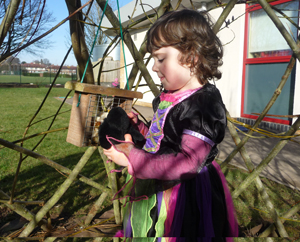Research carried out by YouGov in January 2013 found that 19% of young people did not know that Adam and Eve were Biblical characters. Although the survey took place just after Christmas, 30% of 12-15 year olds did not recognise the Nativity narrative as a biblical story, rising to 35% when only 15 year olds were considered. A further 43% of respondents had never read, seen or heard the story of Jesus’ crucifixion.

Religious Education for our younger pupils is often associated with exploring festivals but, with a bit of imagination and some good resources, RE can be much more than that.
Spring is the perfect time to make the most of the outdoor learning environment. With many nursery settings and KS1 classes enjoying topics linked to the natural world at this time of year, it is important to recognise that religious education can make an enjoyable and worthwhile contribution. Popular topics such as Mini-Beasts, Gardens, Our World, The Park, Animals, Birds, New-life and Spring all lend themselves well to RE.
However, to ensure that we are properly including RE in our topic planning, we must first identify what makes RE distinct from Personal, Social, and Emotional aspects of learning and Cultural understanding – areas with which RE often gets confused!

A supply teacher recently recounted her experience when asked to teach RE to a reluctant Year 6 class in a rural primary school. In introducing the lesson she was greeted with groans of “Oh no, not RE Miss!” Not a great start she thought. However, at the end of the lesson, clearly having won her pupils over, she was told “that wasn’t RE Miss, that was fun!”
So why do many pupils (and teachers?!) groan at the thought of RE? Presumable they think that the subject is uninteresting, irrelevant and disconnected from their own life experiences. Many primary school teachers have had little training in RE and can lack confidence when it comes to teaching about a variety of world faiths. Pupils will easily pick up on this and lessons can lack the same challenge and pace as other subjects.
But, as our supply teacher above clearly demonstrated, RE lessons can be stimulating, vibrant and thought provoking when led by an enthusiastic and inspiring teacher. With the right approach, RE is relevant, meaningful and extremely valuable to all pupils of all backgrounds and abilities. It is thought provoking, enlightening, challenging, stimulating and fun!

A community-driven platform for showcasing the latest innovations and voices in schools
Pioneer House
North Road
Ellesmere Port
CH65 1AD
United Kingdom